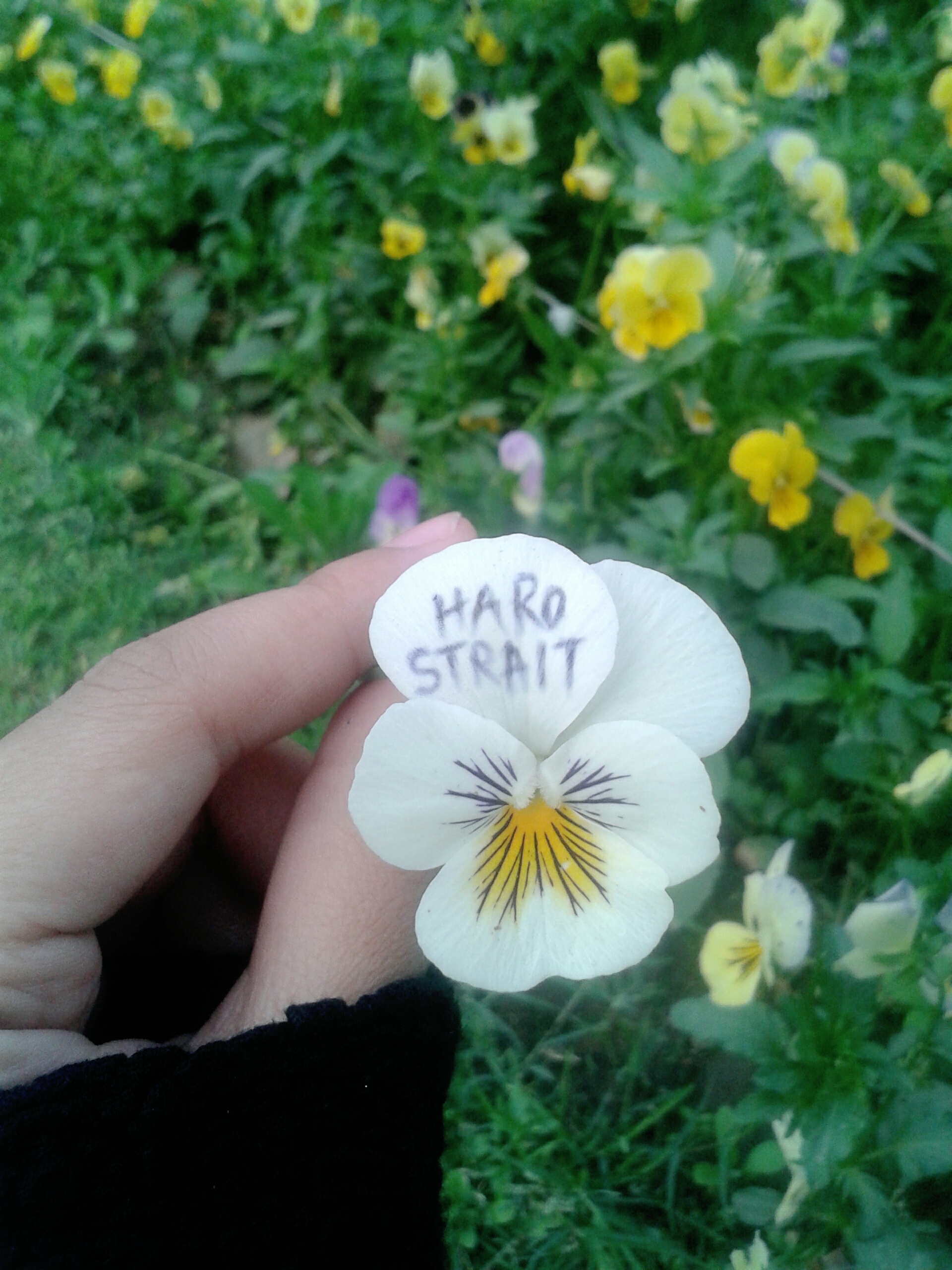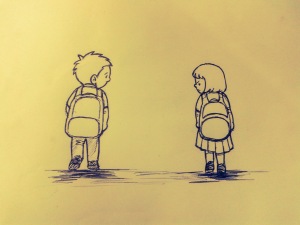“I’m hungry again. It has been raining all morning, and I can tell that my brother is worried. He and I are both excruciatingly aware that we went to sleep last night hoping to wake up to the prospect of a hot meal at school. If we make it there in this rain. I’ve been living in this town for a year, my brother for about three. He’s only two years older than me, but he’s my sole support system here. I like to think he relies on me, too, but I don’t really know. It’s just the two of us here and he takes care of everything. Being thirteen years old would have meant I was a grown boy back in my village but here, I’m a child with a lot more on my shoulders than the other town children living with their parents. Sometimes I don’t know who I am. That doesn’t sound very pleasant, but it’s still better than remembering who I actually am. My brother and I are the children of poor farmers in the village who work their fingers to the bone to keep us here in the town so that we can go to school. Sometimes I dream of being like the other kids. They have mothers who shout at them for not eating, fathers who drive them to school and back, parents who fuss over their report cards and birthday parties. Us? We have to worry about next week’s meals. We don’t have kind uncles or aunts who spoil us. Grownups love you only if you wear nice clothes and go to a good school. Sometimes I wonder what it’s like in the schools they go to. They speak English, and their teachers know their parents. My brother and I are relieved on the days we get to eat three meals. Coming back to that, we must get ready for school. Our rice has run out, and the shopkeeper wouldn’t let us take any more on credit, and there are still five days left of this month. If our parents manage to send us money by the start of next month, maybe we can stay home on the heavily rainy days. But not today. We need the midday meal at school so that we can go to sleep with some biscuits for dinner tonight.”
“Thui, let’s go! The rain seems to be slowing down a little!” cried his brother from the door.
Snapping out of his thoughts, Thui hurriedly ran after his brother and the duo set out under one brown umbrella, dressed in their school uniforms and rubber slippers, bracing themselves for the muddy roads. The rain beat down hard on the town that morning, and the two shivering young boys fading in and out of the mist had to make stops along the way for shelter. One such stop was at a big shop with a large tin roof covering the entire cemented pavement in front of it. As the boys stood there soaking, quiet and staring out into the rain, a man drove up in a car, got out with a large, sturdy umbrella and walked hurriedly onto the pavement. He was about to step into the shop but stopped when he saw Thui and his brother.
“Boys, what are you doing here on a day like this? Surely, school has been cancelled today?!” he said, noticing how cold and drenched they were in their school uniforms.
“We still have to go,” murmured Thui, not making eye contact.
“Our teacher said we could get lunch there,” added his brother.
The man’s eyes became a little sad and he didn’t ask any more questions. He walked into the shop, and came out a few minutes later with a new green umbrella and handed it to Thui. “Here, this is for you. This rain is too heavy to share umbrellas,” he said. He sounded as if he was trying to talk cheerfully but his solemn face betrayed his tone. The shopkeeper looked on from inside the shop, sipping hot tea from the lid of a Milton flask and stacking a shelf of biscuits. His own children were home that day, warm, dry and safe. He watched the two brothers jump back onto the road and carry on their way, the green umbrella staying steady against the sweeping rain.

When the two finally marched up to their school, they felt the familiar thick air of the hot steaming pots of food and tea as their teachers and other staff hustled about in the school kitchen, cooking and looking after the preparations. They both quietly sighed in relief and went to each of their classrooms, where they would have to wait to be called for lunch. Thui went to his usual seat next to his friend and nudged him on the shoulder, giggling. His best friend Cham, who was a little younger than him, was an orphan living with his relatives. Cham was more of a help than family to the people he was living with and he could only afford to go to this school because it was for free and classes were only a couple of hours a day. He was still irregular and depended almost solely on the school and thoughtful teachers for his school supplies. Cham didn’t respond to the greeting but sat quietly, covering his face with a notebook, making Thui poke him again, saying, “Hey! What are you doing?” Cham still did not look at him and was instead scratching the pages with his fingers quietly behind the book and trying to look away towards the window, shuffling his feet. A girl in the seat behind him nudged Thui and whispered, “Miss gave him a brand new notebook, so he’s crying.”
Thui then, with softer movements, sat down next to his friend. In that classroom filled with noisy kids jumping to the sound of the tin roof and the old wooden window panes, the two boys sat still. A lot of the children in that classroom had stories which weren’t happy or easy to carry, but somehow, they always found a way to be children in that space with their teachers and each other. And on that particular rainy morning, the drenched class in tattered school uniforms and rubber slippers was a cheery bunch as they waited for some warm food. In there, they were not the ones carrying plates to others like they did every other day at the town households they were living in. Cham did not laugh and play with them on that particular day but it was still a safe place for him. To cry, to feel, to have a teacher who thought of him, to be understood by his friend who sat next to him, drumming his fingers softly on the desk.
As the kids chattered and licked the last bits of food off their paper plates, Miss Suina stood outside the door chatting with another staff member, sipping hot tea. The heavy rains usually made the town still, and that morning too, was not very different, but the small building was awake and brimming with warm murmur. After a few minutes, Miss Suina walked over to the teacher’s table, beaming, looking at the children warmly as they put their plates away in the bin near the door. Her eyes followed them as they all ran out to the verandah and put their hands out under the gushing trails of water falling off the roof. Time could very well have slowed down as Miss watched the children, splashing and playing, their eyes alive and no longer hungry.
“Miss! Miss! What story will you tell us today?” Miss was jolted out of the quiet reverie she was allowing herself. She had been drifting away to her own memories of childhood. There were no “good schools” and “bad schools” back then. There were just schools. She too had put her hands out under little waterfalls of roof rainwater, she too had gotten drenched in the rain. But all those years ago, every child did. Not just the ones who go to free schools with midday meals like now. She wanted so much more for these children. They shouldn’t have to walk into school blue-lipped, shivering and eager to eat.
“I’ll tell you about the tiger and the monkey today!” she said smiling brightly.
“Miss! I have my own tiger story!,” chirped a boy from somewhere in the middle row.
“Your streaky face looks like one, too,” said a girl seated across him.
The class roared in laughter as they shuffled in their seats and prepared for another one of their teacher’s fantastic stories. School went on for longer than usual that day. The children did not complain. If they could live there, they would have. Some of them were often secretly happy going to school on rainy days, hoping to be kept there longer by the rain. Smiling, sniffing, holding little overused pencil stumps with pen caps on top to make the pencils longer, they often lost themselves in those rooms. There was something about the way the mist covered and hid them away from the eyes of the town on mornings like that.
It was finally time to go home. The rain had stopped, the late afternoon sun was out and bright again, shining through, making leaves glimmer and all kinds of mountain insects dance. Thui held the now folded green umbrella as he walked beside his brother.

“Look, big brother! The peaches are ripe!” he exclaimed, pointing to the peach tree that stood with its bright fruits hung low by the side of the road. His brother hopped a little to the nearest branch and pulled it down with the handle of his umbrella while Thui jumped up and picked a handful. A few others ran up and helped pull down more peach-laden branches and set about plucking, stuffing their pockets, while the smaller children chased after the ones that fell and rolled past their feet.
“Cham, see you tomorrow! Make sure you come, okay?” Thui finally bid goodbye to his friend and everyone else separating at the little fork in the road. Some were running and chasing, some strolling, some too caught up in chatter to see where their feet were stepping on the moss-filled paths. The young brothers then held a peach each in their hands and kept the rest in their woven sling bags. And then nibbling on their fruits and stepping lighter, they slowly trudged the old mountain road, down and away into the ember sunset.











